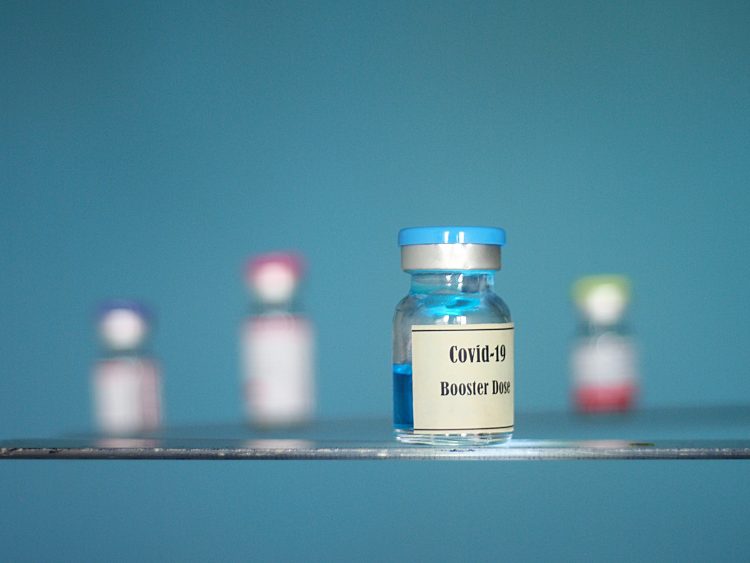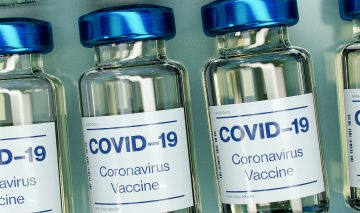If you haven’t, go get a booster shot against Covid-19. Here’s why and how to get it
Pravin Bhatta / August 6, 2022
As Covid-19 cases rise again, experts say booster shots provide greater immunity. South Asia Check explains why additional doses are essential for preventing serious illnesses and hospitalisations.

Covid-19 cases are on the rise again in Nepal in what health experts fear could be the onset of the fourth wave of the pandemic. Even as severe illnesses grow and hospitals report running out of beds, the imperative of getting vaccinated against the virus is becoming more conspicuous than ever. With the passage of time and the influx of new variants, the vaccine efficacy continues to erode, which is why experts advise administering booster doses for those who have received a full dose. The booster shots provide greater immunity to the vulnerable group.
Nepal started its booster dose campaign on January 17 this year and opened it for all above 18 on April 3. According to the Ministry of Health and Population, over 7.3 million people have received booster shots.
What is a Covid-19 booster dose?
A booster dose for Covid-19 is an additional dose administered to individuals who have completed their full dose at least three months earlier. The Covid-19 vaccine helps the body produce antibodies against the virus it has to fight; an already immunised person is administered a new dose of the same vaccine to remind the body about the virus to produce the required number of antibodies.
This additional dose helps our body ramp up our ability to fight the virus, says Dr. Anup Subedee, an infectious disease specialist.
According to Dr. Sameer Kumar Adhikari, joint spokesperson of the Ministry of Health and Population, booster doses are being administered to all vaccinated individuals across the country. “Having limited resources means that we cannot identify immunocompromised people and vaccinate them. A better alternative was to administer it on all eligible candidates as advised by the National Vaccine Advisory Committee,” he said.
Why do we need a booster dose?
Generally, a booster dose is targeted for immunocompromised people who fall in the vulnerable category. But as new variants continue to appear, a booster shot helps protect everyone who completed a full course whose efficacy could have eroded with time.
A blanket approach of administering booster doses is to reduce infections throughout the country, says Dr. Adhikari.
The virus is changing with time. New variants are making their way into the bodies of the infected, to which the earlier antigens produced by the vaccine may not respond appropriately. An additional dose of vaccine helps immunocompromised people fight the virus and curb the severity of the disease. Those who have received a booster shot are less likely to become exposed to severe infection or death, says Dr. Subedee.
Where to get a booster shot?
Dr. Adhikari said booster shots are being administered in coordination with local governments. He added that the local governments manage the vaccine administration, while in cities, big hospitals also administer the booster shots.
“In the case of children, we have targeted schools to administer vaccines. If someone belonging to that age group could not be vaccinated at school, they can be vaccinated through local level wards offices,” Dr. Adhikari told South Asia Check.
“The person who wants to get vaccinated with the third dose of the vaccine has to provide a vaccine card as proof. However, those who declare themselves fully vaccinated three months earlier receive an additional dose of the vaccine,” said Sagar Dahal, chief of the Child Health and Immunization Service Section at the Family Welfare Division under the Department of Health Services. “Right now, we have Pfizer available for additional dose vaccination,” Dahal added.

Is the booster dose available all the time?
Local governments manage vaccination programs in coordination with the district and ministry, per Dr. Adhikari of MOHP. “It depends on the availability of health workers. In big cities like Kathmandu, hospitals such as Sukraraj Tropical Hospital, Teku and Patan Hospital are administering vaccines daily,” he added.
Why is there a general apathy towards a booster dose?
The response to booster doses is pretty poor, as per the Nepal government’s data. There is a significant difference between a fully vaccinated and a vaccine-boosted population. While 70 percent have been fully vaccinated, only 25 percent have received their booster shots, raising concerns that they may not be interested in booster doses. Dr. Adhikari thinks otherwise. “There is a three-month gap to get a booster dose after full vaccination, and this could be why there are no huge turnouts for booster doses.”
The low turnout is why the government has stopped importing vaccines designated for Nepal, as the consumption is low, said Dr. Adhikari. “We are trying to balance consumption and vaccine availability so as to avoid increased vaccine wastage ratio,” said Dr. Adhikari of MOHP.
Could the low turnout of people at vaccination centres result from a dwindling risk perception, as people think the virus is gone for good? Dr. Adhikari believes otherwise. “Now, as the cases are rising, the number of people coming for booster shots is rising.”
This material is copyrighted but may be used for any purpose by giving due credit to southasiacheck.org.
Comments
Latest Stories
- In Public Interest Covid-19 cases are low, but that’s not an excuse to avoid vaccination
- In Public Interest What is BF.7, the sub-variant that has the world by its grip?
- In Public Interest Threat of a new Covid-19 wave looms large amid vaccine shortage in Nepal
- In Public Interest As cases decline, Covid-19 test centres in Kathmandu are desolate lot
- In Public Interest Dengue test fee disparity has patients wondering if they’re being cheated
- In Public Interest As dengue rages on, confusion galore about what it is and what its symptoms are. Here’s what you need to know
In Public Interest
 Covid-19 cases are low, but that’s not an excuse to avoid vaccination
The Pfizer-BioNTech bivalent vaccines authorised by the Nepal Government provide better protection a...
Read More
Covid-19 cases are low, but that’s not an excuse to avoid vaccination
The Pfizer-BioNTech bivalent vaccines authorised by the Nepal Government provide better protection a...
Read More
- What is BF.7, the sub-variant that has the world by its grip?
- Threat of a new Covid-19 wave looms large amid vaccine shortage in Nepal
- As cases decline, Covid-19 test centres in Kathmandu are desolate lot
- Dengue test fee disparity has patients wondering if they’re being cheated
- As dengue rages on, confusion galore about what it is and what its symptoms are. Here’s what you need to know